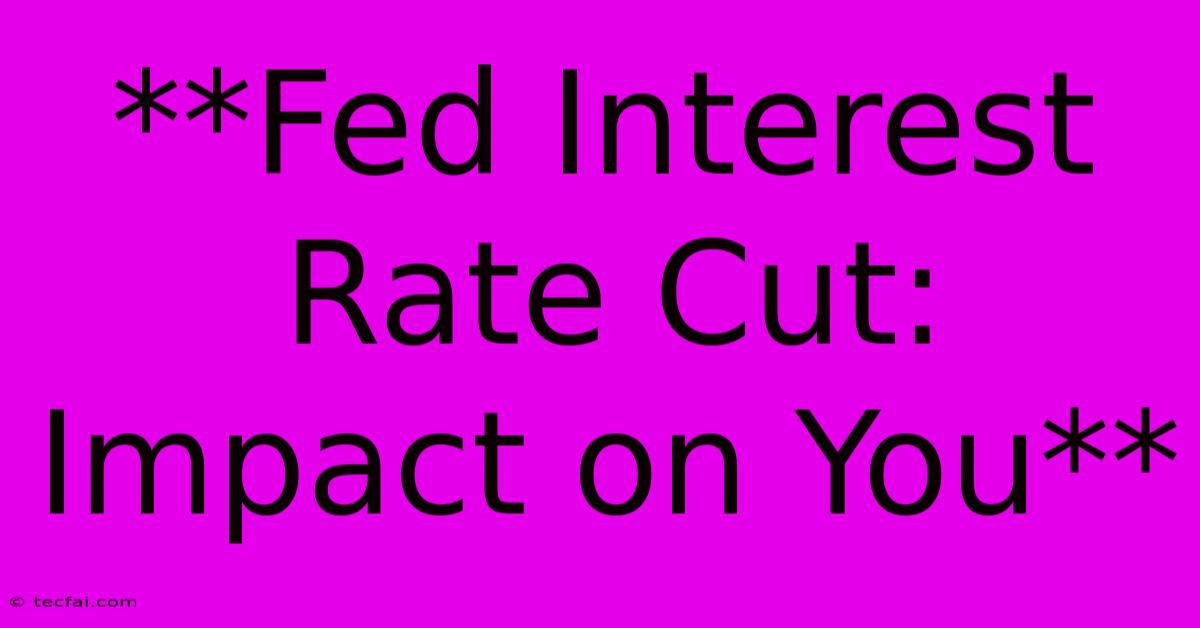**Fed Interest Rate Cut: Impact On You**

Discover more detailed and exciting information on our website. Click the link below to start your adventure: Visit Best Website tecfai.com. Don't miss out!
Table of Contents
Fed Interest Rate Cut: Impact on You
The Federal Reserve (Fed) plays a crucial role in managing the U.S. economy. One of its primary tools is setting interest rates, which directly impacts borrowing costs for individuals and businesses. A recent Fed interest rate cut could have significant implications for you, depending on your financial situation and goals. Let's explore how this move might affect your everyday life.
Understanding the Fed Interest Rate Cut
A Fed interest rate cut means lowering the federal funds rate, the target rate banks charge each other for overnight loans. This action usually leads to lower interest rates on various loans and credit cards, making borrowing more affordable. However, it can also impact savings accounts, potentially reducing returns.
Impact on Your Finances
1. Lower Borrowing Costs:
- Mortgages: Lower interest rates could translate to lower monthly payments for new or existing mortgages, allowing you to save money over the loan's lifetime.
- Auto Loans: Similar to mortgages, a Fed interest rate cut could benefit you if you're planning to finance a new car or refinance an existing loan.
- Credit Cards: While credit card interest rates might not immediately drop, they could become more competitive as lenders adjust to the new environment.
2. Potential Impact on Savings:
- Savings Accounts: Lower interest rates might mean less interest earned on your savings accounts, potentially decreasing your return on investment.
- Certificates of Deposit (CDs): Rates on CDs might also decrease, impacting your returns, especially if you have long-term CD investments.
3. Economic Growth:
- Business Investment: Lower borrowing costs can encourage businesses to invest in expansion and job creation, boosting economic growth.
- Consumer Spending: With lower interest rates, consumers may be more inclined to borrow money for major purchases like homes or cars, contributing to economic activity.
What Should You Do?
- Review your debt: Explore refinancing options for existing loans, like mortgages or auto loans, to potentially lower your monthly payments.
- Monitor savings rates: If you're concerned about lower returns on your savings, consider exploring alternative investment options with higher potential returns.
- Stay informed: Keep abreast of economic news and updates on interest rate changes to make informed financial decisions.
Conclusion:
A Fed interest rate cut can have both positive and negative implications for your finances. By understanding its impact and taking proactive steps, you can navigate the changing economic landscape and make informed decisions that benefit your financial well-being. Remember, consulting with a financial advisor can provide personalized guidance tailored to your specific situation.

Thank you for visiting our website wich cover about **Fed Interest Rate Cut: Impact On You** . We hope the information provided has been useful to you. Feel free to contact us if you have any questions or need further assistance. See you next time and dont miss to bookmark.
Featured Posts
-
Man Utds Garnacho Confronts Troll In Pre Match Clip
Nov 08, 2024
-
Brampton Workers Strike City Services Hit
Nov 08, 2024
-
Bengals Fall Short Against Ravens 35 34
Nov 08, 2024
-
Europa League Top Scorers Akguen El Kaabi Lead
Nov 08, 2024
-
Tributes Pour In For Kathleen Watkins
Nov 08, 2024
